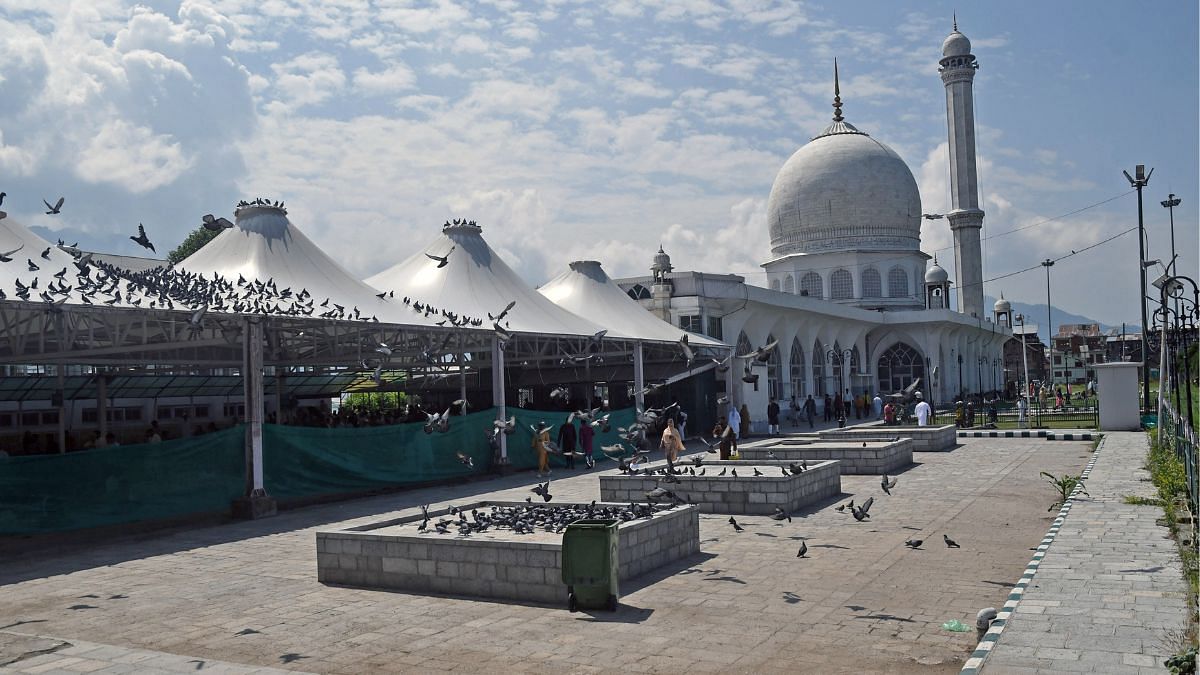New Delhi: The Rs 40-crore Hazratbal shrine development project, which was inaugurated by Prime Minister Narendra Modi Thursday, is one of the 46 projects sanctioned under the Pilgrimage Rejuvenation and Spiritual, Heritage Augmentation Drive (PRASHAD) scheme launched by the Ministry of Tourism in 2014.
While Modi announced 12 new projects under this scheme during his visit to Jammu and Kashmir, the scheme itself has been marred by delays with less than 50 percent (22 projects) completed in the past decade, ThePrint has learnt.
The PRASHAD scheme — earlier called PRASAD since ‘development of heritage sites’ was added to the name only in 2020 — is aimed at the integrated development of popular religious, spiritual and heritage sites to provide essential infrastructure, such as parking, pathways, toilets, illumination, tourist information centres, among others, and promote them as popular tourist destinations.
Under the scheme, a large number of projects being undertaken are at Hindu pilgrimage sites, including at the Somnath temple (Gujarat), Srisailam temple (Andhra Pradesh), Kamakhya temple (Assam) and Kedarnath (Uttarakhand), among others.
Development works have also been sanctioned at other religious and heritage sites, including at Hazratbal shrine and Ajmer Sharif Dargah; development of pilgrimage facilitation at Four Patron Saints, Yuksom (Sikkim); development of Chamkaur Sahib (Punjab), development of Patna Sahib (Bihar); development of pilgrimage tourism infrastructure at Zunheboto (Nagaland); river cruise tourism at Varanasi, among others, according to ministry’s reply to a question in the Lok Sabha last month.
In its report tabled in Parliament in March 2023, the Standing Committee on Transport, Tourism and Culture had cited a response from the tourism ministry to say that delays in identification of implementing agencies as well as approval from the forest department and local authorities, and the pandemic were to blame for the delay in completion of projects.
The committee, headed by Rajya Sabha MP and YSR Congress leader V. Vijayasai Reddy, had expressed concern over the delay in the completion of the projects.
“Considering the fact that this scheme was initiated in 2014-15, the progress is very slow. The committee observes that all the projects, both completed and ongoing, under PRASHAD have had delays of at least one year,” it said.
A senior ministry official admitted that many projects have been delayed.
The delay in implementation of the projects, which has to be executed by the respective state governments, has been due to various factors, such as delay in getting necessary approvals from state authorities, preparation of detailed project reports (DPRs) and availability of land, among others, said the official, who did not wish to be named.
The official added, “In some places, Archeological Survey of India did not permit to carry out development work due to proximity to the heritage sites, etc.”
Meanwhile, the ministry in a written response to questions by ThePrint, said: “Some of the major challenges with respect to the sanctioning of projects pertain to delay in submission of DPR as per the toolkit, delay in identification of land parcel, absence of requisite No Objection Certificates, delay in tendering of sanctioned component.”
Also Read: Expanding its tribal outreach, Modi govt enlists IITs, IIMs to aid development in tribal regions
73 sites identified, 46 projects sanctioned so far
A total of 73 sites from across the country were identified for the scheme, based on daily footfall, cultural, historical and heritage importance, status of existing level of development, number of heritage monuments and their accreditation status, among others.
According to tourism ministry officials, the projects were proposed by the state governments and cleared by the ministry. A majority of the projects sanctioned under the scheme were for the development of facilities at popular temples across the country.
In the past decade, the tourism ministry sanctioned a total of 46 projects (covering 51 destinations) in 26 states and Union Territories to be developed at an estimated cost of Rs 1,632 crore, according to the ministry’s reply to a question in Lok Sabha.
Of the 46, six are in Uttar Pradesh, including three in Modi’s constituency Varanasi, five in Gujarat, and three each in Andhra Pradesh, Uttarakhand and Telangana, among others.
The Modi-led Bharatiya Janata Party (BJP) government sanctioned 28 projects during its first term, of which completion of a large number of projects, including Hazratbal, has been delayed by over a year.
Sanctioned in 2016-17, the Harzratbal shrine development project was to be completed by December 2019 but was eventually completed only last year, according to senior officials with the J&K tourism department.
Similarly, projects at Srisailam temple in Andhra Pradesh and Guruvayur temple in Kerala (both sanctioned in 2017) were delayed by 26-28 months and were completed in May and February 2021, respectively, according to the parliamentary panel report. The report adds that a large number of sanctioned projects have been delayed by one or two years.
“Some projects like the development of Mathura-Vrindavan as Mega Tourist Circuit (Ph-II) and development of basic facilities at Vishnupad temple, Gaya, Bihar, have had a delay of four years. The committee also observes that some of the targets in the EFC (Expenditure Finance Committee) proposal of October 2021 pertaining to this scheme have not been achieved,” the parliamentary panel went on to state in its report.
According to ministry officials, projects at 10 more identified sites are yet to be finalised.
“Process of selection, identification and sanctioning of projects under PRASHAD is a continuous process. Projects sanctioned under the scheme are developed in a collaborative manner with the State/UT governments,” said the ministry official quoted earlier.
Meanwhile, work on 12 newly sanctioned projects in Rajasthan, Andhra Pradesh, Puducherry and Mizoram, among others, is in various stages of approval, the official added.
(Edited by Richa Mishra)
Also Read: 85% of platform-based gig workers put in 8 hrs daily but don’t get basic social security — NGO survey

